Book contents
4 - Decline and Revitalization
Published online by Cambridge University Press: 21 November 2020
Summary
Abstract
The General who Awakens the World had, by the 1960s, left the military and resumed his monastic life as Shengyan. Like Yinshun, he would become one of the most significant Chinese Buddhists of the twentieth century. Shengyan's scholarship on religious history aimed to show how belief systems fit into a scheme of religious evolution, according to which Buddhism— using academic evidence—was judged as more “advanced” than other traditions, including Christianity. Using two of Shengyan's academic works, this chapter shows how his Buddhist apologetics represented an elaboration of Yinshun's scholarly approach to upholding notions of Buddhist superiority. Buddhists had lamented what they saw as the decline of their tradition in the twentieth century; Shengyan's scholarship was also an attempt to restore “true” Buddhism, which would be seen as thoroughly compatible with the modern world.
Keywords: revival, history, Shengyan, “Comparative Religion”, “Research into Christianity”
According to the canon, the Buddha knew his teachings wouldn't last. The religion he founded incorporates the notion that the Dharma would decline over time, meaning it would become progressively more difficult for beings to attain enlightenment. This narrative ran parallel to abstract notions of Buddhist history—past and future—in which the universe progressed through a cycle of emergence, existence and destruction. Buddhas like Śākyamuni appeared in the world one after another, passing through more or less the same biographical process. The idea that Buddhism is presently, inexorably losing its capacity to bring enlightenment is therefore a definitive part of the tradition—and the transience of his wisdom in the world is a part of the Buddha's identity.
This narrative of decline became especially important in the sixth and seventh centuries in China, and later in the twelfth and fourteenth centuries in Japan, reflecting an anxiety about the capacity for liberation in an age so far removed from the Buddha’s. Various time-spans came to be attributed to the stages in this scheme. In the first, the Dharma proliferates, and full awakening remains possible with the proper degree of effort and practice. In the second, the Buddha's teachings are not transmitted in full—it becomes harder to attain enlightenment. And in the third, the Dharma has become corrupted; it is exceedingly hard to access the Buddha's authentic teachings, and therefore to realize his universal truth.
- Type
- Chapter
- Information
- Buddhist Responses to Christianity in Postwar TaiwanAwakening the World, pp. 149 - 176Publisher: Amsterdam University PressPrint publication year: 2019



